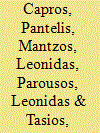| Srl | Item |
| 1 |
ID:
103440


|
|
|
|
|
| Publication |
2011.
|
| Summary/Abstract |
In 2009 the EU decided to reduce greenhouse gas emissions at least by 20% in 2020 compared to 1990 and to supply 20% of energy needs by 2020 from renewable energy sources. This paper uses an energy model coupled with a non-CO2 greenhouse gas model to assess the range of policy options that were debated to meet both targets. Policy options include trading of renewable targets, carbon trading in power plants and industry and the use of the Clean Development Mechanism to improve cost-efficiency. The models also examined fairness by analysing the distribution of emission reduction in the non-emission trading sector, the distribution of CO2 allowances in the emission trading sector and the reallocation of renewable targets across Member States. The overall costs of meeting both targets range from 0.4% to 0.6% of GDP in 2020 for the EU as a whole. The redistribution mechanisms employed significantly improve fairness compared to a cost-effective solution.
|
|
|
|
|
|
|
|
|
|
|
|
|
|
|
|
| 2 |
ID:
169736


|
|
|
|
|
| Summary/Abstract |
We extend and use the PRIMES energy model to explore pathways towards climate-neutrality in the EU by 2050 and 2070 and analyse implications on energy demand, supply and costs. We draw on the modelling, data and scenario framework developed by the authors to support the European Commission's “Clean Planet for All” communication, released in November 2018. Based on model results for numerous scenarios and sensitivity runs, we analyse key issues to explore feasibility, uncertainties, costs and priorities for climate-neutrality strategy. We suggest that a sustainable climate-neutral energy system in the EU is feasible using known technologies. We emphasise that the EU's climate and energy package for 2030 currently in legislation is not sufficient to ensure climate neutrality by 2050. We characterise as of “no-regret” options promoting energy efficiency, renewables and electrification where cost-effective. However, carbon neutrality also necessitates alternative options of “disruptive” nature. Technologies supporting the disruptive options are not yet mature in industry. High uncertainty surrounds their learning potential. Their deployment heavily depends on policies facilitating investment. The system analysis based on the model illustrates the importance of sectoral integration. We argue that hydrogen, and to a certain extent synthetic carbon-neutral hydrocarbons, are critical elements among the disruptive options.
|
|
|
|
|
|
|
|
|
|
|
|
|
|
|
|